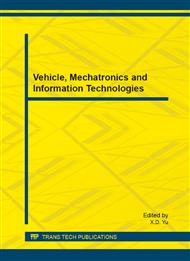p.379
p.384
p.388
p.393
p.398
p.403
p.408
p.413
p.417
Research the Intelligent Injection Wells Monolayer Segment Control Strategy
Abstract:
Testing and commissioning process for intelligent injection process of production engineering monolayer segment flow have strong non-linear, interlayer interference, time-varying, complex model and other characteristics, using the traditional model-based control strategy can not meet the control requirements, puts forward the new dual-core structure variable spacing of the self-adaptive fuzzy control strategy, the rate of change of flow error and flow error as the controller input, through the sub-fuzzy The Controller Online amend the main fuzzy controller input and output dilation factor of the universe, and the universe with the amount of control variable parameters to variable space adjustment, and simplify the design and implementation of a variable universe fuzzy controller. Simulation results show that the proposed control strategy used in intelligent injection wells in the monolayer segment flow control system, allowing the system to obtain better control performance, and shorten the response time and reduce the overshoot.
Info:
Periodical:
Pages:
398-402
Citation:
Online since:
August 2013
Authors:
Price:
Сopyright:
© 2013 Trans Tech Publications Ltd. All Rights Reserved
Share:
Citation:


